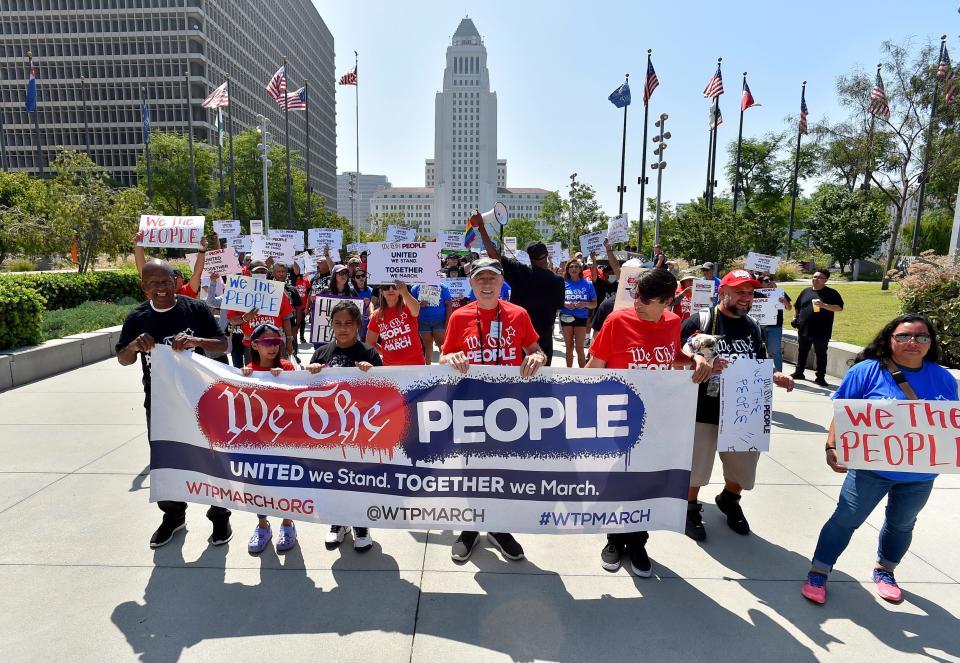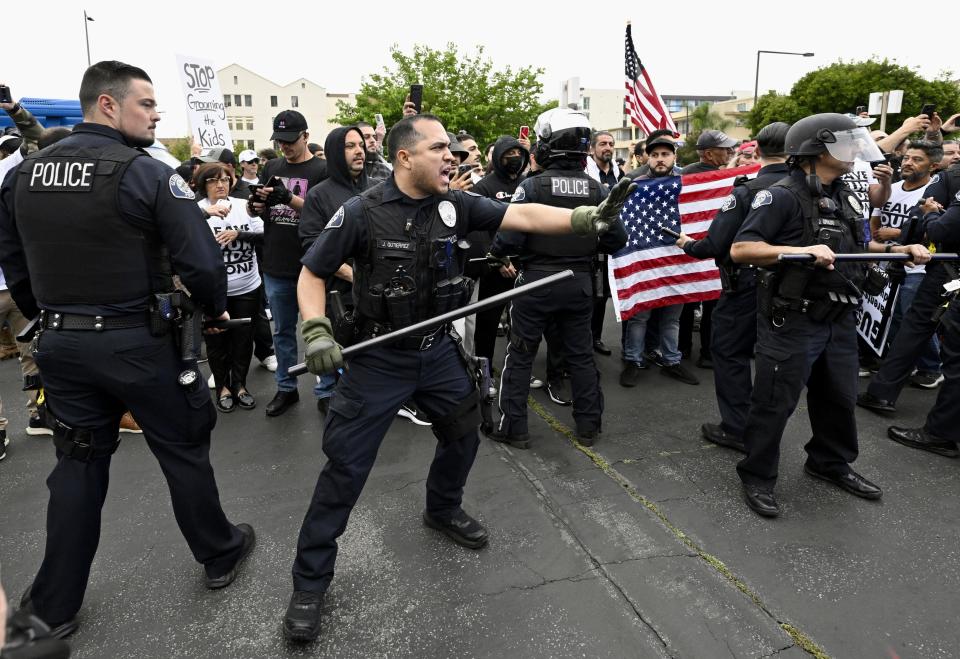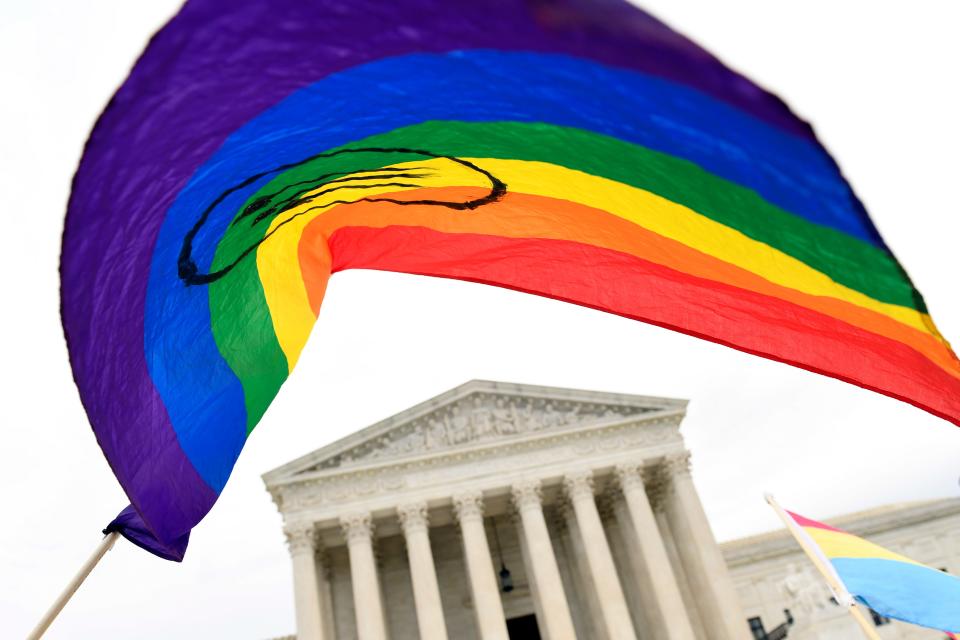Do most Americans oppose Supreme Court LGBTQ ruling? It depends on the poll.
Corrections & Clarifications: This article has been updated to include additional nonpartisan sources of data and research.
Support for LGBTQ rights has grown since the Supreme Court legalized same-sex marriage, but surveys show the issue of whether business owners have the right to refuse service to LGBTQ people because of their religious beliefs continues to divide Americans.
Late last month, the nation's high court sided with a Colorado business owner who argued a state nondiscrimination law could not compel her to make same-sex websites and stifle her own religious views.
Support for the rights of LGBTQ people as clients of a business owner who holds certain religious beliefs is much lower than public support for same-sex marriage. In 2023, 71% of Americans support marriage equality, which was legalized nationally in 2015, according to Gallup.
But a recent poll by the nonprofit, nonpartisan Pew Research Center found that far fewer, about 38% of respondents, expressed support for LGBTQ customers and said business owners should have to provide services that may conflict with their views.
It's hard to tell, however, exactly what Americans think.
Data on LGBTQ inclusivity published last year by the U.S. Chamber of Commerce found 86% of small business owners said it's important to provide an inclusive culture for customers. And data out this month from a group that describes itself as a progressive think tank, Data for Progress, found 65% of voters believe businesses should not be allowed to turn away customers who are of a particular sexual orientation because of the business owner's personal beliefs. Notably, Republicans were split on the issue.
The findings come as LGBTQ rights are increasingly under attack in state legislatures and other courts.
A matter of free speech: Supreme Court backs web developer who didn't want to create same-sex wedding sites
Despite the onslaught of moves to curtail the rights of LGBTQ people, the Data for Progress survey found voters "consistently land on the side of nondiscrimination, rejecting the idea that business owners should be able to refuse services to a member of a protected class based on personal beliefs," said Rob Todaro, the group's communication director.
Civil rights advocates and legal experts argue the underlying issue of whether LGBTQ Americans are entitled to nondiscrimination protections in public accommodations was ultimately not decided in the Supreme Court's 303 Creative v. Elenis decision. Rather, the case was more about a business owner's right to freedom of expression.
"The court kicked the can down the road on LGBTQ protections," said Heron Greenesmith, a lawyer with the legal advocacy group Political Research Associates and a professor at Boston University's School of Law.
Across all 50 states, the Civil Rights Act of 1964 already says businesses serving the public cannot discriminate based on a customer's race, as well as other factors. But the law says nothing about sexuality or gender identity.

What did the Supreme Court say about LGBTQ rights?
The Supreme Court's 303 Creative v. Elenis decision sided with a web designer who argued a Colorado anti-discrimination law couldn't be used to compel her to develop same-sex wedding sites.
Justice Neil Gorsuch wrote the 6-3 opinion, which was decided on ideological lines.
After the decision, LGBTQ advocates warned it could lead to more discrimination at places of business.
"Inclusion and equal protection under the law build stronger communities and environments where ALL individuals can thrive and reach their full potential," said Erin Uritus, CEO of Out and Equal, a group that works for LGBTQ equality in the workplace and advises corporate human resources departments.
In her statement, Uritus said the "most successful businesses in the nation lead with inclusion," despite the vocal public opinions of anti-LGBTQ groups.

'Yet another weapon in the arsenal' of anti-LGBTQ hate
Across the U.S., LGBTQ people make up only 7.2% of adults in the U.S. Yet their rights have increasingly come under attack in state legislatures.
Many anti-LGBTQ bills introduced and passed in statehouses in recent years were pushed by the Alliance Defending Freedom, a Christian legal advocacy group. In the 303 Creative v. Elenis case, the CEO and president of the ADF argued before the high court on behalf of the web designer.
In legal filings, ADF argued the Colorado law "requires (the small business owner in Colorado) to create custom websites celebrating same-sex marriage."
Advocates and legal experts say such arguments can foster fear of LGBTQ people.
"The ADF is counting on you to join them in seeing the LGBTQ community as an outsized threat compared to the actual percentage of adult Americans who identify as lesbian, gay, bisexual or transgender," Greenesmith said.
The Supreme Court's decision in the case is "yet another weapon in the arsenal or arm of the octopus" of the "same people who are pushing the legislation," Greenesmith said.

Most Americans support LGBTQ rights, surveys find
Another recent survey also found most Americans support nondiscrimination protections for LGBTQ people.
Most American adults – including two-thirds of those identifying as Catholics or Christians – disagree with religious-based denial of medical care, employment or other services to LGBTQ individuals, according to a September 2022 survey conducted by the University of Chicago in partnership with the Williams Institute, a think tank dedicated to gender identity and sexual orientation research at the University of California Los Angeles School of Law.
Still, polling that asks questions on the right of a business owner to refuse service based on their religious beliefs shows more mixed results.
A 2022 survey from Marquette University's law school found 40% of respondents opposed allowing a business to refuse services, while 25% said they'd favor a Supreme Court ruling that would permit a business to do so. However, 35% of respondents said they had not heard of the 303 Creative case or said they had not heard enough to have an opinion.
Apart from opinion-based polling, data shows a significant group of Americans vote based on their pro-LGBTQ political values.
The Human Rights Campaign in 2016 began quantifying support for LGBTQ rights among everyday Americans by identifying voters who said they support pro-LGBTQ rights political candidates and vote against anti-LGBTQ candidates.
This group of voters, dubbed "equality voters," accounted for nearly 4 in 10 (37%) of general election voters in the 2020 presidential election, according to the Human Rights Campaign.
Nondiscrimination protections never passed in Congress
Experts say LGBTQ rights are particularly vulnerable to Supreme Court decisions because Congress has never passed anti-discrimination protections related to public accommodations for sexual orientation and gender identity, unlike longstanding protections for race.
Democratic lawmakers in Congress have repeatedly introduced and championed the Equality Act in recent years, but it has never cleared both chambers.
The law would require states to put in place nondiscrimination protections for LGBTQ people in public spaces, which include businesses like restaurants, gas stations and hotels.
Contributing: John Fritze, USA TODAY; Kate Sosin, The 19th
This article originally appeared on USA TODAY: Do most Americans agree with the Supreme Court LGBTQ case ruling?

